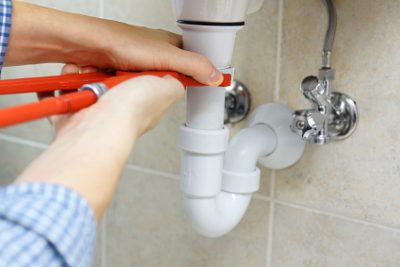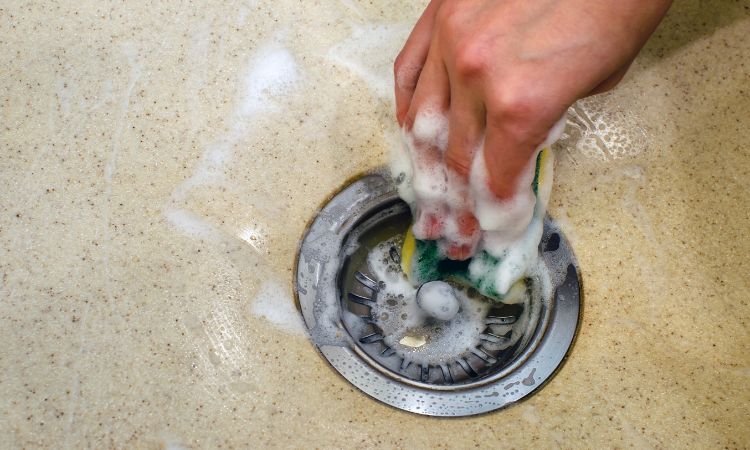Methods To Simply Resolve A Slow-Draining Sink
Methods To Simply Resolve A Slow-Draining Sink
Blog Article
This article further down involving How to Fix a Slow Draining Sink is definitely enjoyable. Don't overlook it.

Introduction
We have actually all existed: You're cleaning your teeth or cleaning your hands, and you discover the water pooling in the sink. As opposed to rapidly swirling away, it lingers, turning your once-refreshing morning routine into a small overload scene. A slow-draining sink isn't just bothersome; it's commonly a sign of bigger plumbing concerns hiding underneath the surface. The good news is that the majority of slow-draining sinks can be fixed with a little knowledge, a few standard tools, and some persistence. All set to tackle this job head-on? Let's roll up our sleeves and dive right in.
Recognizing the Causes of a Slow-Draining Sink
Prior to you begin poking around in your pipes, it aids to know what may be creating the slowdown. Recognizing the root cause makes it simpler to pick the right repair.
Usual Offenders Behind Slow Water Drainage
So, what's clogging things up? Typically, it's a blend of day-to-day particles-- assume hair, soap scum, toothpaste residue, and leftover food fragments. Over time, these little bits accumulate and cling to the pipe wall surfaces, slowly tightening the flow and making it harder for water to pass through. In some cases, mineral deposits from tough water can also include in the gunk, producing the excellent tornado for stubborn obstructions.
When is it Time to Do Something About It?
If you observe the water draining slower than normal, it's an excellent concept to intervene quicker rather than later on. Waiting too long could cause complete clogs, undesirable smells, or even pipe damage. If the water takes more than a couple of secs to clean out after turning off the tap, consider it a warning and get ready to put on your do it yourself hat.
Devices and Materials You'll Require
The right devices make all the distinction. The good news is, you won't require a totally equipped plumber's van to get the job done.
Vital Devices for DIY Repair Works
A bettor is your go-to starting point. A little, sink-sized plunger creates suction that can dislodge minor clogs. For more consistent obstructions, a drainpipe snake (often called a plumbing professional's auger) functions wonders. A set of handwear covers, a flashlight, and maybe a pair of safety safety glasses are additionally convenient.
Suggested Cleansing Solutions
Mild recipe soap and hot water can aid break down oily build-up. A mix of baking soft drink and vinegar is a reliable natural home remedy, and enzymatic cleansers supply a more environment-friendly technique. Maintain chemical drain cleaners as a last option, as they can be rough on your pipelines.
Safety First: Safety Measures and Prep work
Prior to you launch into unclogging mode, think about security. You're handling potentially unclean water and debris, so slip on a pair of gloves. If you're utilizing chemical cleansers, make certain the area is well-ventilated and adhere to the directions on the label.
Protective Equipment and Office Configuration
Put down some old towels or rags around the sink location to catch splashes. Eliminate any type of products that might enter your method, like soap dispensers or toothbrush owners. Ensure you have great illumination-- get a flashlight if needed.
Step-by-Step Overview to Fixing a Slow-Draining Sink
Now, let's enter the nitty-gritty. This step-by-step process will certainly direct you through straightforward methods to recover your sink's drain.
Step 1: Remove and Tidy the Stopper
Commonly, the stopper (that tiny plug you push down to obstruct water) is the very first offender. Remove it thoroughly and clean off any kind of hair or substance trapped around its base. Wash it thoroughly before placing it back in position.
Step 2: Use a Bettor to Dislodge Particles
Got that plunger all set? Position it over the drainpipe and give it a few firm pumps. The concept is to develop suction that can loosen any type of clog. If you see bits of particles floating up, you're on the best track.
Action 3: Attempt a Drain Snake or Cord Hanger
If the bettor doesn't suffice, it's time to bring out the drain snake. Gently feed it right into the drain and twist as you go. You may really feel some resistance-- that's likely the obstruction. Maintain turning and pulling till you get rid of the blockage. If you do not have a drain serpent, a straightened wire hanger can work in a pinch.
Tip 4: Use a Do It Yourself Drain Cleaner
A natural cleaner made from cooking soft drink and vinegar can break down residual crud. Pour half a cup of baking soft drink into the drain, followed by half a cup of vinegar. Allow it fizz for about 15 minutes, then flush with warm water. This chemical reaction typically does wonders for minor blockages.
Step 5: Reassemble and Check the Sink
Put every little thing back with each other and run the faucet. Does the water now swirl away at a commendable rate? If yes, provide yourself a pat on the back. If not, do not despair-- there are still a few even more tricks up your sleeve.
Alternative Techniques for Stubborn Clogs
Not all blockages are produced equal. If your sink still refuses to work together, think about these alternate services.
Sodium Bicarbonate and Vinegar Approach
We already touched on this, but it deserves keeping in mind once again. This gentle, environment-friendly technique is safer than chemical cleansers and usually fairly efficient.
Chemical Drain Cleansers
Enzyme-based cleaners utilize all-natural bacteria to absorb organic matter. They're an outstanding choice if you're aiming to avoid extreme chemicals. Simply remember, they may take a bit longer to function their magic.
Chemical Drain Cleansers: Advantages And Disadvantages
Chemical cleansers can blast with tough clogs fast, but they're not without disadvantages. They can produce warmth and fumes, damage pipes if utilized excessively, and posture environmental dangers. Utilize them moderately, and constantly adhere to the instructions thoroughly.
Safety Nets to Keep Your Sink Flowing
Prevention is the best cure. By embracing a few basic habits, you can keep your sink from reducing to begin with.
Normal Cleansing Behaviors
Clean down the sink basin and fixture location frequently. Remove hair or food particles before they have an opportunity to wash down the drain.
Staying Clear Of Damaging Materials Away
Hesitate prior to discarding coffee premises, grease, or coarse vegetable scraps down the sink. These wrongdoers cling to pipe wall surfaces, developing blockages over time.
Routine Maintenance Checks
Arrange a fast monthly evaluation. Run warm water via the sink for a few minutes, focusing on the circulation. If it appears slow, act quick before it ends up being a full-blown clog.
When to Call a Professional Plumbing Technician
Sometimes, no matter exactly how hard you attempt, that block just will not budge. That's when it's time to generate the pros.
Indicators That Show an Extra Major Problem
If your sink drains slowly despite numerous attempts, or if you notice water supporting in other fixtures (like your shower or commode), you might have an extra serious pipes problem hiding deeper in the system.
Stabilizing Do It Yourself Efforts with Expert Help
While DIY can save you money and supply a sense of success, there's no shame in calling a specialist. A professional plumbing can examine your entire plumbing configuration, ensuring there's no underlying damage or long-lasting trouble that can cost you much more later on.
Comparing Prices and Long-Term Solutions
Before deciding, consider the big picture. A cheap, quick fix might solve the problem temporarily, yet buying a more permanent service could save you cash and stress in the long run.
Weighing the Costs of Do It Yourself vs. Expert Solutions
Do it yourself fixes usually set you back little bit more than the price of a plunger or a container of cooking soft drink. Expert solutions, on the other hand, featured a price yet may protect against repetitive concerns and pricey repair services later.
Buying Quality Fixtures and Upgrades
If your sink's style adds to frequent blockages, it could be worth upgrading to higher-quality components or altering the pipes design. Consider this a financial investment in your home's performance and comfort.
Final thought
A slow-draining sink can feel like a minor irritation, however it's typically an indication that your pipes requires a little tender loving care. By recognizing the root causes, utilizing the right tools and techniques, and dedicating to straightforward preventive measures, you can keep your sink streaming openly. And when all else fails, never ever be reluctant to call an expert-- your home's pipes deserves the financial investment in treatment and upkeep.
Three Common Ways to Fix a Slow Drain
Baking Soda Method
Boil a full pot of water. Measure out cup of baking soda and pour it down the drain. Then take cup of the magical cleansing substance known as white vinegar and drop that down there too. Allow the mixture to fizz in the drain for five minutes as the vinegar and baking soda combine. Now dump in that whole pot of boiling water. This combination of cleaning substances should clear out anything that is causing your sink to drain slowly. If it doesn t...
Zip-It
If the baking soda method doesn t clear out your drain, it may be because a significant amount of hair and/or other debris has collected there and you need to remove it. Purchase a Zip-It tool at any home improvement or hardware store and insert it into your drain. It will catch any collected hair or debris that s blocking the flow of water. Pull it out. If it s got a big clump of hair, etc. on the end, you ve probably got your culprit.
Drain Cleaner
If these methods don t work, there is the standard drain cleaner that you can also buy in a hardware store or even your local grocery store. It s better if you can use a household solution, but these drain cleaners often work in a pinch. They re very simple to use. You generally just dump them in your drain and wait. If even this method is not effective, it may be time to call the plumber.
https://www.mrrooter.com/oneida/about-us/blog/2017/july/three-common-ways-to-fix-a-slow-drain/

I stumbled upon that piece of writing on Three Common Ways to Fix a Slow Drain while doing a lookup on the internet. Those who appreciated our blog entry plz do not forget to pass it around. I love reading our article about Solved! How to Fix a Slow Sink Drain.
Appointment Report this page